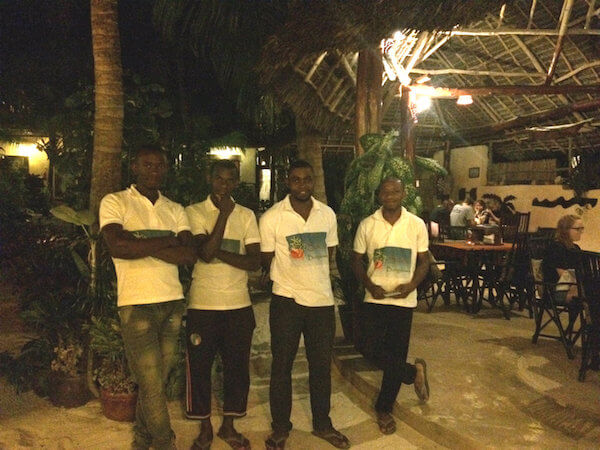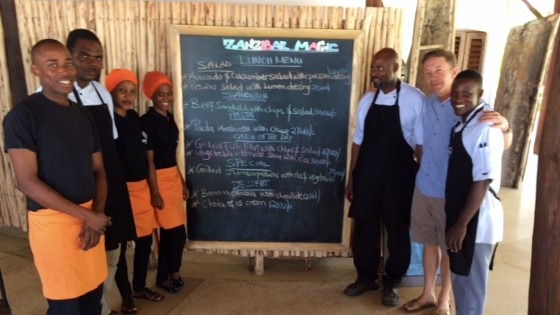What’s it like to teach English in Africa? Russell completed the BridgeTEFL IDELTOnline™ Program and is currently working as a consultant manager within the hospitality industry in Zanzibar, Tanzania, where his job includes English training for hotel staff. We asked him about his experience.
Can you tell us a bit about yourself? What is your background?
My name is Russell Titmas. I am a third-generation South African citizen, where my hometown was Cape Town. In university, I studied Business Management where my focus was Market Development and Operational Management.
Did you have a different career before this?
The first part of my working life was spent in the food industry. Then, I ventured into the Packaging Industry for twenty-two years, developing markets within Africa as well as internationally.
How long have you been teaching English?
When you move into management roles in Africa, you don’t realize just how much time you spend teaching and mentoring. Education in many African countries is not where it should be so we as managers play a huge role in educating staff, suppliers, etc. I have been involved in task-based teaching for around twenty-five years.
Can you tell us about your current teaching job?
After leaving the corporate system, I decided to take a position in Tanzania as a consultant manager within the hospitality industry. I focus on Supply Chain Management and systems training as well as on-the-job staff training.
I currently do the English food training at a wonderful Boutique Hotel in Zanzibar, Tanzania called Zanzibar Magic Boutique Hotel. This is my sixth hotel during my stay of almost 5 years in Tanzania.
Who are your students?
My students are mainly of African descent, with their main language being Swahili. They are both male and female from diverse cultural, religious and ethnic backgrounds. Their ages vary from 18 years through to their 50s. The education level is extremely poor due to poor systems in a country where English is only recognized within the Tanzanian schooling system from the age of 15. Most of the young adult staff and learners are at a CEFR level of between A1 and A2. This leaves students with a huge amount of catching up to do.

Some of the staff Russell teaches
What’s a typical workday like for you?
Everything we do within the hospitality industry is seen as Task-Based Learning – on the job training with authentic and current materials. My day starts with breakfast food pronunciation as well as order understanding and writing. The next part of my day is lunch menu preparation with all kitchen staff. We focus on word understanding, pronunciation and writing. The next part of my day is the reservations department. Here, I sit with the staff, teaching e-mail etiquette and professional response writing to all potential clients.

A sample menu created by Russell’s students
I take the handwritten menus for the day and pass them on to the waiting staff, who then under my guidance move the menu onto the large menu board in the form of a lesson. From there, I assist them with structure and spelling. This procedure happens twice a day every day.
Can you share a classroom or teaching tip that you’ve learned along the way as a teacher?
Tanzanians, like their Asian counterparts, struggle with comprehension and vocally find it extremely difficult to roll their ‘R’s and ‘L’s. Trying to teach the phonetic chart would not be possible. Teaching the students by showing them your mouth movements and getting them to understand what part generates what is the most important lesson they can learn when it comes to understanding the sounds and pronunciation.
There are many factors which contribute to this difficulty for them, but the main one being tribal. Different tribes pronounce different letters and words differently and these English sounds don’t exist in their first language, the /r/ and /l/ difference being one of the most well-known examples. An any time of the day filler and trick I use is to constantly, in passing of my staff/students, roll the letter ‘R’ off my tongue for e.g. ‘Rrrrrrrr.’ I have them do the same, and then end in a word like run, road, rum, ran, ready etc. It’s fun, and they love it!
Learn more teaching strategies in this free BridgeTEFL eBook: How to Teach English to Adults.
Can you tell us about a particular experience in your teaching career when you felt like you made a difference in someone’s life?
Africa creates so many experiences where you know you have made a difference. Arriving in Zanzibar, I was confronted with a group of kitchen staff who could not speak a word of English. Being a vital part of the hotel’s success, it was important for me to get them to a basic level of understanding and communication. Four years later, 4 of the 6 staff are now employed in a 5- star hotel and thriving.
What are your future career goals after you teach English in Africa?
My future goals are to continue teaching language, specifically Business Language and Corporate communication within Europe as well as online.

The village of Matemwe that Russell passes through daily
What recommendation do you have for someone who wants to teach in Tanzania/ Zanzibar?
Don’t just arrive. Come to Tanzania/Zanzibar on a fact-finding mission to see if you will be able to handle the diversity Tanzania produces. Get a full understanding of the cultural and religious beliefs. Lastly, before any teaching can commence, you have to gain their respect.









